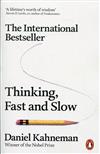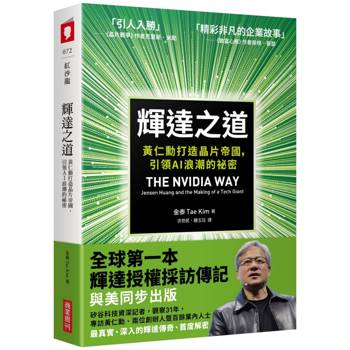慢慢讀,反覆讀,跟著他踏上美妙的心智探索之旅。
當代最偉大的心理學家、諾貝爾經濟學獎得主--康納曼灌注五十餘年研究功力,推出人類社會思想史上,第一本全面深度剖析大腦思考運作的「思考聖經」。
不僅可能改變你的思維方式,甚至改變你的工作、生活與人生。
Amazon、《紐約時報》、《華爾街日報》、《經濟學人》年度選書
「快思」與「慢想」是我們腦中的兩位主角。它們大部分時候是朋友,有時是敵人,更常一起並肩打仗!
我們何時要相信直覺?何時要對抗直覺與偏見,召喚所有理性出來打仗?我們總以為能駕馭自己的思考,事實上,人們的行為常常受到未知因素所影響。我們對思考的機制充滿假設與誤解,又很依賴直覺的感知和記憶,常常做出因個人偏見導致的錯誤決策。
如果你希望自己更聰明、更冷靜,就要學會掌握「快思」與「慢想」的遊戲規則。
康納曼介紹了很多有趣的經典行為實驗,披露思考的捷徑、替代、偏好、框架、錨點等效應。不僅讓我們對大腦的複雜與非理性恍然大悟,也指出我們在什麼情況下該相信靈光乍現,什麼時候該三思而行,該運用哪些技巧來避免常常使我們陷入麻煩的思考偏誤,以及如何在商場、職場和個人生活中做出更好的選擇。
閱讀本書就像是一趟心智突破之旅,康納曼有如一位稱職的導遊,沿途為我們解說思考到底是怎麼一回事,系統1(直覺式思考)和系統2(邏輯式思考)這兩個主角在各種心理劇碼中如何搭配分工。
「這是快思的系統1,它很情緒化,依賴直覺,見多識廣又很會聯想,擅長編故事,系統1能迅速對眼前的情況做出反應。但它很容易上當,以為親眼所見就是事情的全貌,任由損失厭惡和樂觀偏見之類的錯覺引導我們做出錯誤的選擇。」
「這是慢想的系統二,它動作比較慢、擅長邏輯分析,系統1無力解決的問題,都丟給系統二處理。它雖然不易出錯卻很懶惰,經常走捷徑,直接採納系統1的判斷結果。」
康納曼重新詮釋了決策與判斷、風險、幸福和財富的關係,推翻了經濟學對人的決策是理性的假設,更首度披露「直覺偏見」和「邏輯捷徑」如何在不知不覺中,決定了我們自以為愜意的生活與社會樣貌,也將徹底改變你對思考的看法。
Daniel Kahneman, recipient of the Nobel Prize in Economic Sciences for his seminal work in psychology challenging the rational model of judgment and decision making, is one of the world’s most important thinkers. His ideas have had a profound impact on many fields-including business, medicine, and politics-but until now, he has never brought together his many years of research in one book.
In Thinking, Fast and Slow, Kahneman takes us on a groundbreaking tour of the mind and explains the two systems that drive the way we think and make choices. One system is fast, intuitive, and emotional; the other is slower, more deliberative, and more logical. Kahneman exposes the extraordinary capabilities-and also the faults and biases-of fast thinking, and reveals the pervasive influence of intuitive impressions on our thoughts and behaviour. The importance of properly framing risks, the effects of cognitive biases on how we view others, the dangers of prediction, the right ways to develop skills, the pros and cons of fear and optimism, the difference between our experience and memory of events, the real components of happiness-each of these can be understood only by knowing how the two systems work together to shape our judgments and decisions.
Drawing on a lifetime’s experimental experience, Kahneman reveals where we can and cannot trust our intuitions and how we can tap into the benefits of slow thinking. He offers practical and enlightening insights into how choices are made in both our professional and our personal lives-and how we can use different techniques to guard against the mental glitches that often get us into trouble. Thinking, Fast and Slow will transform the way you take decisions and experience the world.
★本書中譯版《快思慢想》由天下文化出版。
作者簡介
康納曼 Daniel Kahneman
康納曼生於1934年,在加州大學柏克萊分校取得心理學博士學位。現任普林斯頓大學心理學教授和伍德羅威爾森學院公共事務教授,並兼任希伯來大學理性研究中心研究員。他在心理學上的成就挑戰了判斷與決策的理性模式,被公認為「繼佛洛依德之後,當代最偉大的心理學家」。他的跨領域研究對經濟學、醫學、政治、社會學、社會心理學、認知科學皆具深遠的影響,被譽為行為經濟學之父,更於2002年獲頒諾貝爾經濟學獎。
Daniel Kahneman is a Senior Scholar at Princeton University, and Emeritus Professor of Public Affairs, Woodrow Wilson School of Public and International Affairs. He was awarded the Nobel Prize in Economics in 2002.












